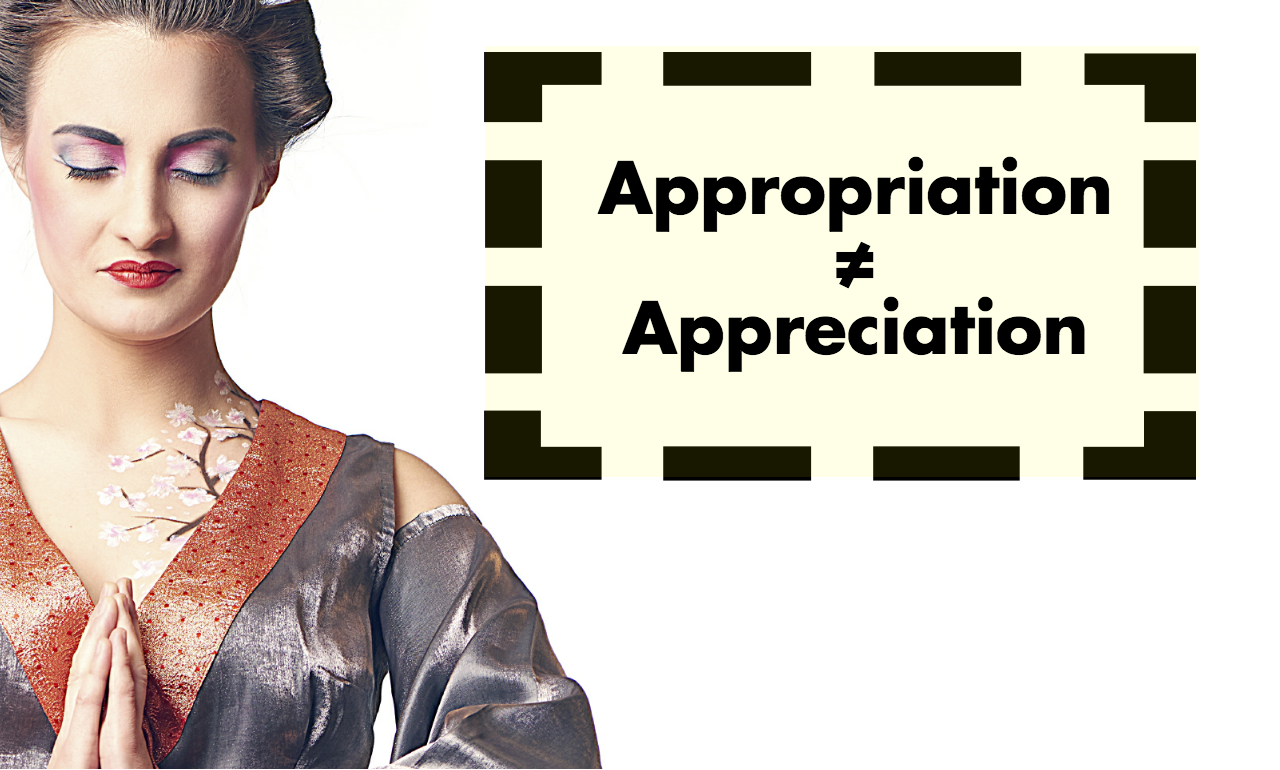“Words matter.” – Cara Jade Myers, Jenny Marlowe
Cultural representation (or misrepresentation) has been one of my burning issues for a while. I have mixed feelings about the whole ethnic endorsement by a different, and sometimes, disconnected, group of people. Now don’t get me wrong. I am all for freedom of expression. But I’m not sure exactly where we should be drawing the line between cultural appreciation and appropriation.
Lets understand this by taking a look at the meaning of cultural appropriation. Cultural appropriation is the adoption of icons, rituals, aesthetic standards, and behavior from one culture or subculture by another. Not such a bad thing eh, you might ask? At the very core, cultural appropriation is almost synonymous to cultural representation you could argue. Here’s my problem though. Historically, it is usually the case that the subject culture is a minority culture or somehow subordinate in social, political, economic, or military status to the appropriating culture.
Again you could ask where lies the problem? It so happens that when we are adopting/representing a culture different from ours, we often tend to exaggerate or misrepresent certain details. This error can be attributed to several factors: incorrect media representation, lack of information, lack of interaction with the said culture, etc. Consequently, these ill-informed representations lead to a steady perpetuation of stereotypes, followed by (unintentional) offensive cultural digs.
A deeper understanding of cultural appropriation also refers to a particular power dynamic in which members of a dominant culture take elements from a culture of people who have been systematically oppressed by that dominant group. Yes, we can argue about the existence of this power dynamic our whole lives, dear readers. But there is no denying that this power dynamic definitely exists. And this power dynamic is the reason certain cultures are over represented in the media while some cultures are not appropriately represented.
However, cultural appropriation goes way beyond inaccurate representation. At the very least, cultural appropriation allows people to show love for the culture, but remain prejudiced against its people. At worst, it trivializes violent historical oppression. In the creative/fashion industry, it lets some people get rewarded for things/actions/feats the creators never got credit for.
Let me give you an example from my country India. I believe Priyanka Chopra, an Indian actor, has become a household name now. She is well known now for portraying the role of a brown woman in Quantico. What some of you may not know is that in 2014, she starred as Mary Kom, in the 2014 eponymous movie. Mary Kom is an Olympics Bronze medalist and India’s only woman boxer to have won a medal in each one of the six world boxing championships. I have an issue with this movie because Kom is one of the very few representatives of mainstream sports-persons, let alone women athletes, from Northeast India.
Now if you follow Indian media/politics, you’ll know that the marginalized tribal residents of Northeast India have been historically under-represented and denied equal opportunities from mainstream media, sports, academics, etc. This is a classic case of cultural appropriation: a mainstream, popular actor assays a marginalized, ethnic person. The makers of the movie went an extra mile. To give Chopra the authentic look, they tried to give her “chinky eyes”, a feature stereotypically associated with Asian and mongoloid Indians. And limited English knowledge too. But perhaps what hurt most was the fact that Chopra earned more from the movie than Mary Kom did from her Olympics and all sporting events. Power dynamics much?
The purpose of my article is to get a conversation started around cultural representation. I would love to talk about how we can rectify the current ethnic scenario in mainstream media and what steps can we take to be more informed and sensitive?
I’d like to end this with a BuzzFeed video I came across a couple months ago. The video tilted “Native American Make Up tutorials” is hosted by Cara Jade Myers and Jenny Marlowe. I believe Myers and Marlowe make some very compelling points on cultural appreciation versus appropriation.
Do leave your comments below and let me know your thoughts on this issue.


